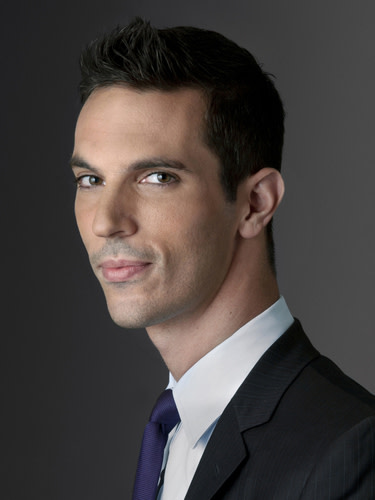Q&A: NPR's Ari Shapiro

Not many people know Ari Shapiro, National Public Radio’s White House correspondent, grew up in Portland. Even fewer know that when he isn’t reporting from the Romney campaign trail—where’s he’s been for more than year—he moonlights as a singer for local lounge band Pink Martini. Shapiro has performed live with the group and lent his familiar voice to its last two records; he’ll visit Portland this weekend to record tracks for a third and appear on the radio variety show Live Wire! Saturday with Pink Martini bandleader Thomas Lauderdale.
Culturephile talked with Shapiro about the secret likeable Romney; the difference between speaking on NPR and singing at the Hollywood Bowl; and the responsibility that comes with a soapbox.
Culturephile: You must be exhausted. How long were you reporting from the campaign trail for?
Ari Shapiro: Since the very beginning. The Iowa caucuses were January 3rd, and I was on the campaign trail with [Romney] even before that…But it was really toward the end that it was, like, a five-states-a-day, nonstop, constant marathon.
In your recent NPR story looking back on the campaign, you talk about how Romney was a likeable guy off the record, but got stilted when tape recorders and cameras were rolling. How much of that likeable guy did you personally get to see on the trail?
Not a lot. He did very little off-the-record stuff with the press—he did very little on-the-record stuff with the press, too, which is unusual for candidates. There are people who would trace that to a secrecy in all manner of things that Romney did, whether it was choosing not to release his tax returns or wiping the computers before he left the governor’s office in Massachusetts, but I think the reason for his personal privacy was that every time he did speak off the cuff, he just said things that came out sounding so wrong, and that distracted from the message, and that made him sound like the worst stereotype that everybody was trying to portray him as...
He did give an off-the-record chat at the back of his airplane as he was flying from Indianapolis to Tampa to give his speech for the Republican convention. He came to the back of the plane and talked with us for, like, 20 minutes about a wide range of things. Afterwards, I said to the aides who had set it up, “I’ve never seen this side of Romney before. You’re doing him a disservice by not allowing us to film that and tape it and record it.” And the aide said to me, “You don’t understand; if the cameras came out, that side of him would disappear…At some point, I’m going to have to tell him that a session is off the record and tell you guys that it’s on the record, because that’s the only way we can capture this genuinely likeable guy.”
Does covering a presidential race make you feel icky about America?
Not at all. It was amazing just getting to know America over the course of this race. At every rally, I would talk to a few people for a few minutes…and I would ask them about their lives, about what was important to them, about what worried them, what was on their minds, why they decided to come to a political rally. And I realized that most people, myself included, get a sense of America from fiction, whether it’s Faulkner and Steinbeck novels or Real Housewives shows, and by actually having conversations with people—thousands of them, collectively, over the course of the campaign—I feel like I got a sense of America that I didn’t have before—how people in Colorado are not the same as people in New Hampshire, and the issues in Florida are not the same as issues in Ohio.
OK, enough politics. How did you get involved in Pink Martini?
I was a fan when I was a kid. I used to go to their shows at La Luna and Berbati’s Pan; I would sneak in before I was 21...
I became friends with them, like, a decade ago and started throwing parties for them whenever they would pass through D.C. for shows. I would do a brunch or a dinner and have them over to my house. Then, three years ago, they came through D.C. and I threw a sort of backyard barbeque that ended up going late into the night and turned into a sing-along around my piano until, I don’t know, three in the morning, or four. The next morning, I was at my desk at NPR and Thomas [Lauderdale] called and said, “You know, we have this concept for a song on the next album that we want a man to sing; why don’t you sing it?” And I thought, "Well, that’s crazy, and it’s never gonna happen, but sure.”
So I came out to Portland to record that song with them—“But Now I’m Back,” which is on the album Splendor in the Grass—thinking that would be a one-off thing. Then [Lauderdale] said, “Well, we need to find a time for you to perform it live. How about the Hollywood Bowl?” So…the first time I performed live with the band was in front of—God, I can’t remember how many people it seats, 10,000? [18,000 – Ed. and onetime Hollywood Bowl usher]…Since then, I’ve had the amazing privilege of touring all over the country with them, and I spent a couple weeks in Europe with them last summer, and this is going to be the third album that I’ve recorded with them.
What kind of songs are you recording on this album? Anything different?
We’re going to do a Hindi song from the 1950s, an old Bollywood song, that we started doing this summer in Europe. And I think we’re going to do an old Spanish song that we have been doing for the last couple of years.
Had you sung before performing with the band?
Yeah, I sang in high school and college. I did musical theater, and I did choir, and I took singing lessons, and things like that, but by the time I started singing with Pink Martini, I had not sung for 10 years or more.
How comfortable are you in that public setting, as opposed to your usual public setting?
Well, NPR doesn’t feel public. You’re kind of by yourself in a studio, in front of a microphone, and you can’t tell whether two or two million people are tuning in. So, it’s very different to be live in front of an audience, and hearing and seeing their reaction in real-time…There’s a thin line between stress and excitement. Do I feel nervous? Yes. Do I feel stressed? Yes. But that nervousness and stress feed into what makes it such a rewarding experience.
What do you like to do when you’re home in Portland?
Eat—a lot. I like to ask my local friends which neighborhoods have become newly interesting since the last time I was in town, and then just go walk around those neighborhoods. When I was in high school in Portland, it was like, there was Hawthorne and there was Northwest 23rd. There was nothing interesting happening in North Portland; there was not a whole lot to do in all of the interesting corners of the city that have made Portland such a richly textured place in the last couple of decades. So, I love to see what’s new…Unfortunately, I’m not going to have time to do any of that this time around...but recording with Pink Martini is a pretty great way to occupy that time.
You’ve received a decent amount of attention for being a relatively young, openly gay successful journalist [The 34-year-old Shapiro was the youngest NPR reporter ever to become a correspondent – Ed.]. Do you consider yourself a role model?
Every person, in everything that they do in life, is in all likelihood being watched by somebody younger, whether they’re a public figure or just somebody with a niece or a nephew. So, every one of us is a role model in some way. I appreciate that as somebody who has an audience…more people are watching me than might be watching me if I had a different job, so I try to live my life accordingly. I feel very lucky to have such a big platform, and to have the ability to reach so many people, but I hope that I would be living my life in the same way whether I did or not.
Shapiro will appear on Live Wire! Saturday with Thomas Lauderdale. For more information, visit the show's website.
For more about Portland arts, visit PoMo's Arts & Entertainment Calendar, stream content with an RSS feed, sign up for our weekly On The Town Newsletter, or follow us on Twitter @PoMoArt. Blog content reflects the views of the individual author and not necessarily SagaCity Media, Inc.




